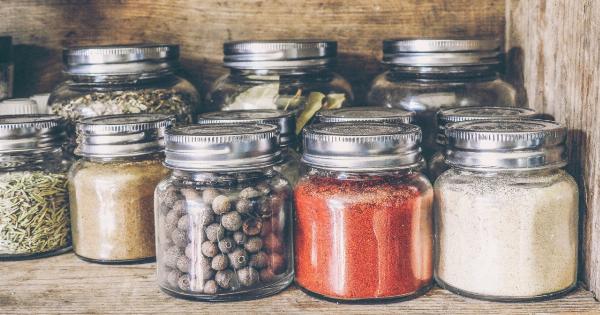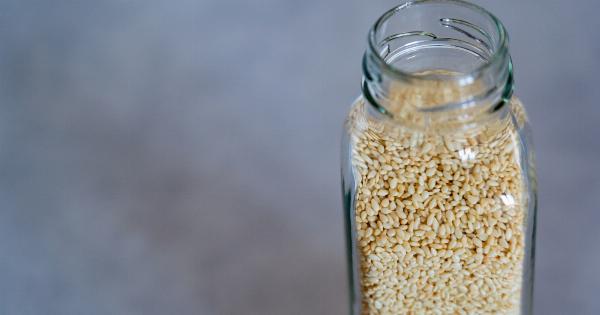Calcium is an essential mineral that plays a vital role in maintaining the overall health and strength of our bones and teeth. It is no wonder that calcium is often associated with milk, as it is an excellent source.
However, if you are not a fan of milk or are lactose intolerant, there is no need to worry. There are various other foods that are high in calcium and can fulfill your daily calcium needs. In this article, we will explore some of these alternatives, so you can make informed choices for your dietary requirements.
1. Chia Seeds
Chia seeds are tiny black seeds that are incredibly nutritious and high in calcium. Just one ounce (about 28 grams) of chia seeds contains approximately 177 milligrams of calcium, which is about 18% of the recommended daily intake for adults.
They are also rich in omega-3 fatty acids, fiber, protein, and various other essential nutrients.
2. Sardines
Sardines are a type of small, oily fish that are often found in cans and are popular among seafood lovers. Apart from being a great source of omega-3 fatty acids, sardines are also rich in calcium.
Just 3 ounces (about 85 grams) of sardines can provide around 325 milligrams of calcium, which is approximately 33% of the recommended daily intake for adults.
3. Almonds
Almonds are not only a tasty snack but also a fantastic source of calcium. Just one ounce (about 28 grams) of almonds contains approximately 75 milligrams of calcium, accounting for around 8% of the recommended daily intake.
Almonds are also rich in healthy fats, fiber, and vitamin E. Including almonds in your diet can not only boost your calcium intake but also provide several other health benefits.
4. Broccoli
Broccoli is a versatile and nutrient-rich vegetable that contains a considerable amount of calcium. One cup (about 156 grams) of cooked broccoli provides approximately 62 milligrams of calcium, which is about 6% of the recommended daily intake.
Moreover, broccoli is loaded with vitamins C, K, and folate, making it an excellent addition to a balanced diet.
5. Tofu
Tofu, a popular plant-based protein source, is also a great way to increase your calcium intake.
The exact amount of calcium in tofu can vary depending on the brand and type, but generally, 3.5 ounces (about 100 grams) of tofu contains approximately 350 milligrams of calcium, accounting for around 35% of the recommended daily intake. Tofu is also rich in protein and low in saturated fat, making it a healthy choice for vegans and vegetarians.
6. Kale
Kale has gained tremendous popularity in recent years due to its numerous health benefits, including its calcium content.
One cup (about 67 grams) of raw kale provides approximately 90 milligrams of calcium, which is around 9% of the recommended daily intake. Additionally, kale is packed with vitamins A, C, and K, as well as antioxidants, making it a superfood worthy of incorporating into your diet.
7. Oranges
Oranges are well-known for their high vitamin C content, but they are also a surprising source of calcium. One medium-sized orange contains approximately 52 milligrams of calcium, accounting for around 5% of the recommended daily intake.
Including oranges or drinking freshly squeezed orange juice can be a delicious and nutritious way to increase your calcium intake.
8. White Beans
White beans, also known as navy beans, are not only delicious but also an excellent source of calcium. One cup (about 179 grams) of cooked white beans contains approximately 191 milligrams of calcium, which is about 19% of the recommended daily intake.
In addition to calcium, white beans are rich in fiber, protein, and several other essential nutrients, making them a healthy addition to any diet.
9. Figs
Figs are sweet and nutritious fruits that can help boost your calcium levels. Just 1 cup of dried figs (about 149 grams) provides approximately 241 milligrams of calcium, accounting for around 24% of the recommended daily intake.
Figs are also a great source of fiber and other essential minerals like potassium and magnesium.
10. Edamame
Edamame, immature soybeans, are not only a popular appetizer but also a fantastic source of calcium. Just 1 cup (about 155 grams) of cooked edamame contains approximately 98 milligrams of calcium, which is around 10% of the recommended daily intake.
Edamame is also rich in protein, iron, and various other vitamins and minerals, making it a healthy and calcium-rich addition to your meals.
Conclusion
While milk is commonly associated with calcium, there are plenty of other delicious foods high in calcium that can be included in your diet.
From chia seeds and sardines to almonds and kale, these alternatives offer a diverse range of options to suit different dietary preferences. Whether you are lactose intolerant, vegan, or simply not a milk drinker, you can still ensure you meet your daily calcium needs by incorporating these calcium-rich foods into your meals.
Remember to balance your diet with other essential nutrients and consult a healthcare professional or nutritionist for personalized advice on meeting your nutritional requirements.































